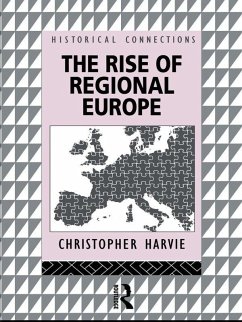In the 1970s and 1980s, there was a steady transfer of power in mainland Europe to powerful regional authorities and these, in their turn, started to build up a form of intra-European cooperation. With the acceleration of European integration, the rise of the multinational firm and new media and transport technologies, the traditional defense-based nation-states are under threat.
In this challenging study, Christopher Harvie alters the ways in which we have traditionally surveyed the European past by setting the positive and negative aspects of the present European situation in their historical context. He reappraises the actors of national' politics, the persistence of types of civic and internationalist discourse, and finally looks at the transactions which have created bourgeois regionalism', and its implications for the future of Europe. Harvie argues that we are only beginning to realize the shift in conciousness, as well as in politics and administration, and that an integrated Europe will evolve.
In this challenging study, Christopher Harvie alters the ways in which we have traditionally surveyed the European past by setting the positive and negative aspects of the present European situation in their historical context. He reappraises the actors of national' politics, the persistence of types of civic and internationalist discourse, and finally looks at the transactions which have created bourgeois regionalism', and its implications for the future of Europe. Harvie argues that we are only beginning to realize the shift in conciousness, as well as in politics and administration, and that an integrated Europe will evolve.
Dieser Download kann aus rechtlichen Gründen nur mit Rechnungsadresse in A, B, BG, CY, CZ, D, DK, EW, E, FIN, F, GR, HR, H, IRL, I, LT, L, LR, M, NL, PL, P, R, S, SLO, SK ausgeliefert werden.









